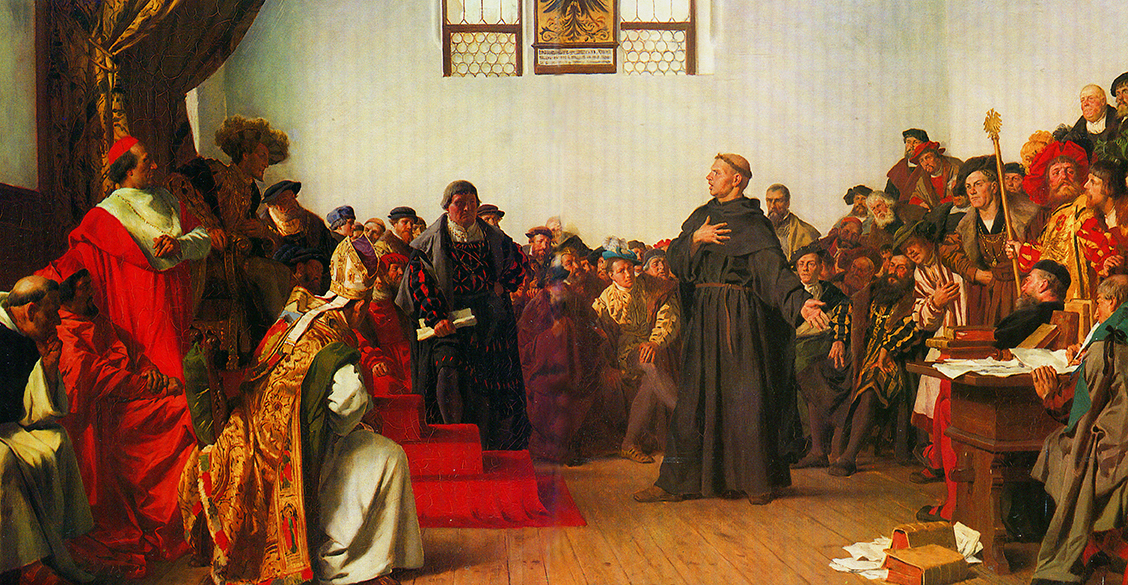503 years ago, Luther nailed his 95 theses to the door of the castle church in Wittenberg. Since then, numerous lies have been made to discredit him and the Reformation he sparked. Having been around many discussions online, I have found a couple of myths that are constantly repeated by Roman Catholics. It gets annoying after you hear of them enough, so let us examine these claims in this blog post.
Continue reading “5 Myths about Luther”Sola Fide Explained
The term Sola Fide has been thrown around by many different sects within Christendom. What does it mean to be justified by faith alone? As the Augsburg Confession outlines:
Also they teach that men cannot be justified before God by their own strength, merits, or works, but are freely justified for Christ’s sake, through faith, when they believe that they are received into favor, and that their sins are forgiven for Christ’s sake, who, by His death, has made satisfaction for our sins. This faith God imputes for righteousness in His sight. Rom. 3 and 4.
AC IV
This doctrine however, has been misunderstood and misrepresented by both Protestants and Roman Catholics alike. Since it is Reformation Sunday, I thought it would be fitting to take a look at what the Lutheran Confessions have to say about Sola Fide. To this end, we turn to the Apology of the Augsburg Confession.
Continue reading “Sola Fide Explained”Idol Worship: The religious character of simping
If you have not been involved in internet culture for the past few years, the notion of giving money to a person streaming behind a computer just to get their attention would be utterly foreign to you. Who would pay for such a thing? Yet this phenomenon has become a large part of the internet for awhile now. While we live in a world that is becoming increasingly irreligious, it is not as if anyone has progressed beyond their natural tendency to worship things. They simply take on a different form instead of your conventional gods.
Continue reading “Idol Worship: The religious character of simping”What should I do if there is no Lutheran Church in my area?
It is common for the new convert to Lutheranism to have discovered the beautiful message of the Gospel only to realise that there is no church in his immediate area that preaches this Gospel in its entirety and administers the sacrament rightly. He then turns to the churches that exist in his area and asks, “Which one is the closest thing to Lutheranism?”. After all, Rome and the East have valid sacraments don’t they? What about the Anglicans, they’re pretty similar to us. Surely I can take the sacrament there? Such a compromising approach is detrimental to one’s faith in the long run, and makes light of the exhortations of Scripture to avoid heterodoxy. Hence in this blog post, we will be looking at the various concerns that would arise from being in such a situation and what one should do instead.
Continue reading “What should I do if there is no Lutheran Church in my area?”Lutheran Christology: The Communication of Attributes
Lutherans have confessed the Christology of the Chalcedonian Council, that the two natures of Christ, the divine and human, are “inseparably enjoined in one Person” (AC III 1). Henry Eyster Jacobs summarizes the Personal Union of Christ according to Chalcedon (A Summary of the Christian Faith, 11, Q31) as follows:
- Unconfused: There is no mingling of the natures, but both remain distinct
- Unchanged: One is not changed into another
- Indivisible (with respect to place)
- Inseparable (with respect to time)
Over the controversy that first arose with the Sacramentarians on the Eucharist, Lutherans have gone on further to elucidate how the divine and human natures commune with one another within the person of Christ (communicatio idiomatum).
Continue reading “Lutheran Christology: The Communication of Attributes”Why Lutherans should not be involved in ecumenical movements
I remember about 2 years ago, there were big talks of revival approaching Singapore, loosely based off a prophecy that Singapore would become the ‘Antioch of Asia’. Churches from different traditions should come together once again to pray together and a nationwide revival would occur in the next year – or so the narrative goes. The church I was in (under the Lutheran Church in Singapore) actively participated in this ecumenical movement. Their general apathy to upholding Lutheran doctrine led me to become disillusioned with the church body as a whole. When they invited a charismatic preacher to the congregation to preach and sell his book I knew that I could no longer remain there in good conscience. It was hard for me as a former charismatic to hear ideas that I had come to reject in my conversion to Lutheranism preached in the congregation of my newfound faith. Hence, I knew I had to leave the church.
Back then, I only left because I was convinced in my mind that charismatic teaching was dangerous and detrimental to the faith. Upon further reflection and study of Scripture and the Book of Concord afterwards, I came to realise that the notion of setting aside denominational differences to pursue a common evangelistic goal runs contrary to the Lutheran Confessions. Since I get asked a lot about this issue, I decided to write a blog post to elucidate my findings.
Continue reading “Why Lutherans should not be involved in ecumenical movements”Luther, Sola Fide, and Baptismal Regeneration
Many in the Protestant world look up to Luther as the champion of Sola Fide. However, when it comes to grappling with how Luther viewed baptism, they would often dismiss it as one of the “works salvation” errors he retained from Rome. This is because they read Luther with many preconceived notions that lead to misunderstandings in his position.
Hence, in this blog post, I would like to explore Luther on baptism and address some of these incorrect assumptions on the matter. To this end, we will be looking at Luther’s Large Catechism on Holy Baptism.
Continue reading “Luther, Sola Fide, and Baptismal Regeneration”






